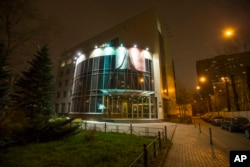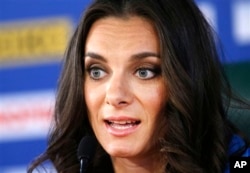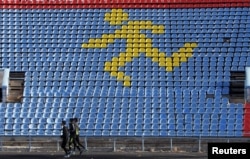As a new doping scandal roiled the Russian sporting world, a decision whether to ban Russian athletes from the 2016 Rio Games over previous violations went into overtime.
On Friday, the International Association of Athletics Federations (IAAF) postponed a final decision over Russia's eligibility for the Olympics until May, arguing that reforms promised from the Russian side still had not been implemented.
Russia's Track and Field Association was provisionally suspended from international competition by the IAAF last November following a condemning report by the World Anti-Doping Association (WADA).
The WADA report accused Russia of state-sponsored cheating and widespread deception in its anti-doping program.
Russian sporting officials blamed the violations on a few corrupt individuals — since dismissed from their posts — and said the anti-doping program had been overhauled in a bid for reinstatement.
Meldonium history
But a series of new high-profile doping violations unveiled this week have renewed doubts on Russia's reform efforts.
At issue is use of the drug meldonium — a Soviet-era medication initially developed to improve Red Army soldiers' endurance in the field.
The drug aids circulation in the blood and is widely used by families in the former Soviet Union as an affordable and non-prescription prophylactic.
Grindeks, the Latvia-based manufacturer of the drug, issued a statement calling meldonium a "therapeutic drug ... not doping."
Yet, after monitoring use of meldonium among athletes last year, WADA added the drug to the banned substances list starting Jan. 1, 2016, arguing it provided an advantage in competition.
New violations
The new meldonium ban has already snared several top Russian athletes, including former world number one tennis star Maria Shaparova, Olympic gold medalist in short-track speedskating Semion Elistratov, and world champion speedskater Pavel Kulizhnikov.
WADA's announcement of the meldonium violations was met with derision by leading figures in the Russian sports world.
Speaking on Russia's 24 TV network, Olympic figure-skating champion Yevgeny Plushenko said athletes should follow the rules, but compared taking meldonium to swallowing vitamin C.
"God how ridiculous all this is," wrote Yelena Isinbayeva, a two-time Olympic pole-vaulting champion on her Instagram account. "My grandmother has been taking Mildonat for the past 6-7 years," using the drug's commercial name.
"Strange, but she hasn't become a super granny yet," she added.
WADA officials say 60 athletes have tested plosive for the drug so far, without identifying them publicly.
Russia's Minister of Sport Vitaly Mutko cautions that more violations by Russian athletes are likely — along with warnings for sports fans to brace for the worst.
"Revolutionary decisions about the return of the Russian team to international competition are not expected," Mutko said Friday.
Throughout its battles with WADA over the doping issue, Russia has swayed between displays of defiance and a willingness to seek compromise.
Athlete 'witch hunt'
Kremlin officials have called the WADA a witch hunt aimed at removing top Russian medal contenders.
Those sentiments were echoed in Moscow again this week.
In an interview with Russia's REN TV channel, Russian Foreign Minister Sergey Lavrov suggested that a western media campaign is aimed at slandering Russia's national image.
"I wouldn't be surprised if soon they say that our air force, army and diplomats are also operating while doping," Lavrov said.
Meanwhile, Sports Minister Mutko theorized the high number of Russian violations was merely a case of the drug lingering in the bloodstream longer than anticipated.
"Our athletes aren't out to commit suicide," Mutko said. "It's possible traces remain in the body for a long time."
But Mutko also called for Russia to impose stronger punishments on trainers and doctors who administer banned substances to athletes.
A Duma committee Friday announced plans to introduce legislation immediately.
Few doubt that Russia's exclusion from the Rio Games would be anything but a disappointing blow to Russian President Vladimir Putin.
The Russian leader has invested heavily in returning Russian athletics to their former Soviet glory — much to Russian sports fans' delight.
Russia placed second at the Summer Games in London, and took the top spot in the medal count when it hosted the 2014 Winter Games in Sochi.







